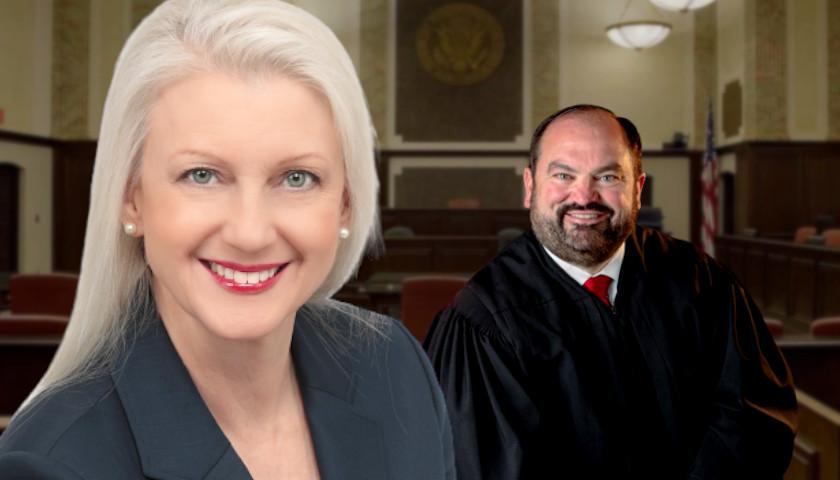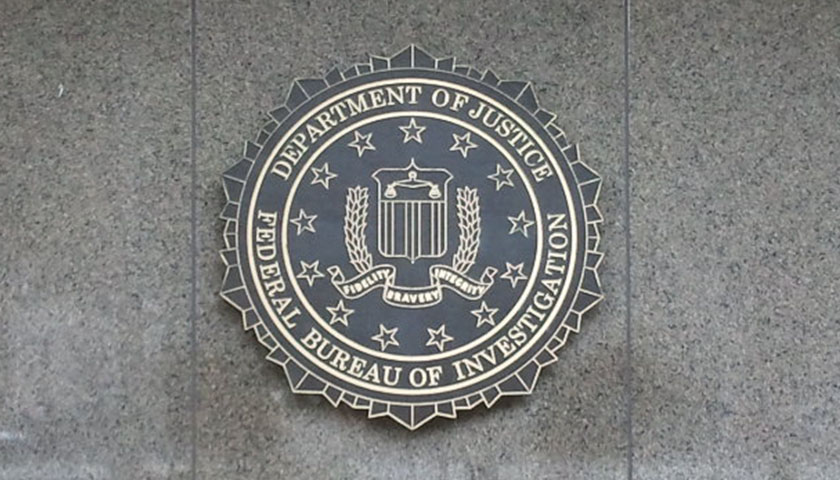A pro-tort-reform nonprofit published the results of its 2023 candidate survey this week, and several state-court hopefuls — including all Democratic contenders — did not respond.
Carolyn Carluccio, a Republican Montgomery County Common Pleas judge running for state Supreme Court, returned the questionnaire to the Pennsylvania Coalition for Civil Justice Reform (PCCJR). Her party compatriots Maria Battista (pictured above, left) and Harry Smail Jr. (picture above, right), respectively, a Clarion County-based former prosecutor and a current Westmoreland County judge who are running for Superior Court, also answered the inquiry.
But Carluccio’s primary opponent Patricia McCullough, who serves on the Commonwealth Court, did not return the form concerning lawsuit abuse and related policy issues. Nor did Megan Martin or Josh Prince, the GOP candidates competing for nomination to the open Commonwealth Court seat.
No Democrats running for a statewide judicial office filled in the questionnaire. The Democrats vying for the nomination to the one open Supreme Court seat are Superior Court Judges Daniel McCaffery and Debbie Kunselman.
Philadelphia Judges Pat Dugan and Timika Lane and Pittsburgh lawyer Jill Beck are meanwhile competing for two available nominations to the Superior Court. Matt Wolf and Bryan Neft are in a primary battle to take on the GOP primary winner for the Commonwealth Court Spot.
Republican primary voters who favor legal conservatism will generally find much congenial in Carluccio, Battista, and Smail’s survey answers. Carluccio and Battista cited the late U.S. Supreme Court Justice Antonin Scalia as their role model on jurisprudence and judicial temperament. Smail named current Justice Neil Gorsuch as his exemplar. None of the three have taken any campaign donations from groups associated with the plaintiff’s bar, nor, they said, are they planning on soliciting such contributions.
Smail was clear when asked to address medical and other liability issues. He affirmed that Pennsylvania suffered a health-litigation “crisis” in the late 1990s and early 2000s before the state prohibited “forum shopping,” meaning a medical-liability lawsuit had to be filed in the county where the alleged malpractice took place.
Asked whether the state Supreme Court was right or wrong to cancel that rule last year, the judge responded that he might be asked to deal with that issue directly as a state judge and, therefore, would not comment explicitly. Still, he wrote, “[P]eople deserve to be judged by a jury of their peers which was happening prior to the 2022 rescission.”
Since the court nixed the venue stipulation and malpractice attorneys have been able to file medical litigation in any venue where the defendant has a business interest, the liberal stronghold of Philadelphia has seen an upsurge of healthcare-liability cases. PCCJR has strongly lamented the Democrat-controlled court’s decision in this and other policy areas.
“The Pennsylvania Supreme Court has charted a course that is harmful to our economy,” PCCJR Executive Director Curt Schroder said in a statement. “The court’s liability-expanding decisions over the past several years pose a grave threat to job creators, medical providers and all those who live and work in Pennsylvania. The [candidate] guide explains the impact of these decisions and the ramifications to residents of the commonwealth.”
Smail also expressed agreement with the original thrust of the state’s Fair Share Act which demanded that a defendant who is only partly liable for damage to a plaintiff would pay recompense coextensive with that liability. (A panel of the Superior Court recently suggested that the act only applies when a plaintiff is comparatively culpable.)
Carluccio and Battista were more reserved in addressing tort-policy questions, mentioning that they may be called upon to issue rulings. Schroder thanked the three responding candidates for answering the questionnaire.
“Candidates who respond demonstrate an understanding and appreciation of the issues of concern to our members,” he said. “We are left to only speculate on the positions and leanings of candidates who did not take the time to respond.”
None of the candidates who failed to return the PCCJR survey responded to requests from The Pennsylvania Daily Star for comment. Keystone Staters will vote on Republican and Democratic nominations for the state courts on May 16.
– – –
Bradley Vasoli is managing editor of The Pennsylvania Daily Star. Follow Brad on Twitter at @BVasoli. Email tips to [email protected].
Photo “Maria Battista” by Maria Battista. Photo “Harry Smail Jr.” by Harry Smail Jr.




